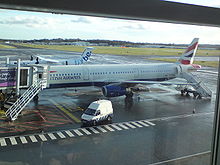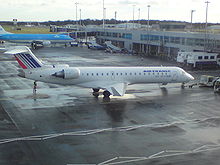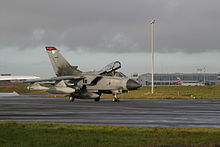- Newcastle Airport
-
For other uses, see Newcastle Airport (disambiguation).
Newcastle Airport 

IATA: NCL – ICAO: EGNT Summary Airport type Public Owner Newcastle Airport Local Authority Holding Company Ltd, Copenhagen Airports A/S Operator Newcastle International Airport Ltd Serves Newcastle upon Tyne
Tyne and Wear
Cumbria
NorthumberlandLocation Woolsington, Tyne and Wear Elevation AMSL 266 ft / 81 m Coordinates 55°02′15″N 001°41′30″W / 55.0375°N 1.69167°WCoordinates: 55°02′15″N 001°41′30″W / 55.0375°N 1.69167°W Website Map Location in Tyne and Wear Runways Direction Length Surface m ft 07/25 2,329 7,641 Asphalt Statistics (2010) Passengers 4,356,130 Passenger change 09-10  5.1%
5.1%Aircraft Movements 66,677 Movements change 09-10  3.7%
3.7%Sources: UK AIP at NATS[1]
Statistics from the UK Civil Aviation Authority[2]Newcastle International Airport (IATA: NCL, ICAO: EGNT) is located in Woolsington in the City of Newcastle upon Tyne, England, 5 NM (9.3 km; 5.8 mi)[1] north-west of the city centre. In 2010 it was the 11th busiest airport in the United Kingdom.[2]
The airport is owned by seven local authorities (51%) and Copenhagen Airport (49%). The seven local authorities are: Durham County Council, Gateshead MBC, City of Newcastle, North Tyneside MBC, Northumberland County Council, South Tyneside MBC and City of Sunderland.
Newcastle Airport has a CAA Public Use Aerodrome Licence (Number P725) that allows flights for the public transport of passengers or for flying instruction.
Contents
History
The Airport was opened on 26 July 1935 by the Secretary of State for Air, Sir Phillip Cunliffe-Lister. Incorporating a clubhouse, hangar, workshops, fuel garage and grass runway, at the time it cost £35,000 to build.
Although during World War II the main airport in the region was located at Cramlington in Northumberland, following the war a decision was taken to concentrate development on the present airport site. Accordingly, in the early 1950s, ex-RAF fighter pilot Jim Denyer was appointed as Airport Manager and within a few years over 5,000 people were using the Airport each year to travel to destinations such as Jersey and the Isle of Wight.
The 1960s saw tremendous growth in passenger numbers at the Airport. This was mainly due to British people taking foreign holidays to places such as Spain instead of holidaying within the UK. A new runway was built, along with an apron and a new air traffic control tower. These new additions were opened by the then-Prime Minister, Harold Wilson.
In the 1970s, with passenger figures approaching one million per year, the Airport status was changed to Category B, making it a regional international airport. The 1980s saw further investment in check-in, catering and duty-free shops. In 1991, Airport Metro station opened, connecting the airport with Newcastle and later in 2002 Sunderland city centres using the Tyne and Wear Metro system. A new £27 million extension was opened in 2000 by then-Prime Minister Tony Blair and the first low-cost airline arrived at the airport, with Go inaugurating a service to London Stansted following the collapse of locally based Gill Airways. 2001 saw the acquisition of a 49% stake in the Airport by Copenhagen Airports.
In August 2004 an extended and refurbished Departure Terminal was opened. The refurbishment comprised a 3,000 square metre extension which included new shops, cafes and 1,200 new waiting seats.[3]
Newcastle was the first regional airport in the UK to install common-use self-service kiosks in the terminal, allowing passengers to check-in themselves without the need to queue at a conventional desk[citation needed]. In 2006 a record 5.4 million passengers used the Airport, according to Civil Aviation Authority figures. Passenger figures were expected to approach seven million by 2009[citation needed], although due to the financial crisis of 2007–2010 and subsequent recession, the actual figure fell short of that number by around 2.5 million.
Rapid expansion in passenger traffic has led to increasing commercial utilisation of the south-side of the airport, which was previously used for general aviation, and is now used for freight, mail and corporate flights. This is partially due to difficulties obtaining departure and arrival slots for light aircraft traffic, which need to be separated from larger aircraft to protect against wake turbulence. As part of the Airport Master Plan, the south-side area is to be expanded with maintenance facilities including new hangar and apron areas. The Newcastle Aviation Academy is also located within this area.
Future plans
The Airport recently published a Master Plan that sets out development proposals for the airport until 2016. In the near term, these include building a multi-storey car park to replace the current short-stay parking, a new 187-bedroom on-site hotel and the expansion of the freight facilities on the south side of the airport. Feasibility studies are being carried out to evaluate the longer-term proposals that include:
- extending the runway at its eastmost end;
- converting the junction with the A696 into a grade-separated junction to cater for the expected increase in traffic levels; and
- the building of a heavy rail link to connect the airport with the National Rail network.
In October 2007 a new Air Traffic Control Tower was completed at a cost of £8.2 million, situated on the north side of the airfield.[4] The now christened ' Emirates Tower ' was designed by REID architects, and bears resemblance to the control tower they designed for Edinburgh Airport. In the process the Newcastle VHF omnidirectional range beacon was permanently withdrawn from service, since the new tower would have interfered with its operation.
Plans were recently announced for a new office development south of the main airport runway. The 3 story scheme should create around 170 new jobs. The airport hopes to expand annual passenger capacity to 10 million (double current capacity) by 2016 and to 15 million by 2030[citation needed].
It is expected that £70 million will be invested in the airport during the current Master Plan period, which runs from 2006 to 2016. The airport also recently finished extending its remote parking for aircraft, resulting in an extra 5 parking stands that can accommodate 5 medium-sized aircraft (Boeing 737 or Airbus A320 size), or 4 large aircraft (Boeing 767 or Airbus A330 size) plus 2 smaller aircraft (such as the BAe Jetstream 41).
Area served
The airport mainly serves Northumberland, Tyneside and Wearside. The airport competes with the smaller Durham Tees Valley Airport for passengers travelling from and to County Durham and Teesside. Passengers from Cumbria, North Yorkshire and southern Scotland also use the airport, the nearest similar sized airport being Leeds Bradford Airport to the south and the larger Edinburgh and Glasgow International airports to the north. In terms of passenger numbers, Newcastle is the third largest airport in the North of England, Manchester Airport being the largest and Liverpool Airport following.
Airlines and destinations
Airlines Destinations Air France Operated by CityJet Paris-Charles de Gaulle Air Malta Seasonal: Malta Air Transat Seasonal: Toronto-Pearson BH Air Seasonal: Sofia, Varna, Bourgas British Airways London-Heathrow BA Cityflyer Seasonal Charter: Milan-Bergamo, Naples, Ibiza Brussels Airlines
operated by BMI RegionalBrussels Eastern Airways Aberdeen, Bergen, Birmingham, Cardiff, Stavanger EasyJet Alicante, Barcelona, Belfast-International, Bristol, Faro, Málaga, Malta, Paris-Charles de Gaulle
Seasonal: Geneva, Ibiza, Minorca, Nice, Palma de MallorcaEmirates Dubai Flybe Belfast-City, Exeter, Jersey, London-Gatwick, Southampton
Seasonal: Guernsey, Hanover, Limoges, RennesJet2.com Alicante, Cork, Dalaman, Faro, Geneva, Heraklion, Kraków, Lanzarote, Las Palmas de Gran Canaria, Murcia, Paphos, Prague, Tenerife-South
Seasonal: Chambéry, Corfu, Dubrovnik [begins 16 March 2012], Ibiza, Málaga, Minorca, Palma de Mallorca, Pisa, Rhodes, Split, ToulouseKLM Amsterdam Lufthansa Regional
operated by Lufthansa CityLineDüsseldorf Manx2 Isle of Man Orbest Orizonia Airlines Seasonal: Palma de Mallorca Ryanair Dublin, Oslo-Rygge [ends 8 January]
Seasonal: GironaSaga Airlines Seasonal: Dalaman Thomas Cook Airlines Lanzarote, Las Palmas de Gran Canaria, Málaga, Monastir, Orlando-Sanford, Paphos, Sharm el-Sheikh, Tenerife-South
Seasonal: Alicante, Antalya, Bodrum, Corfu, Dalaman, Faro, Fuerteventura, Heraklion, Hurghada, Ibiza, Izmir, Kefalonia, Kos, Larnaca, Mahón, Palma de Mallorca, Reus, Rhodes, Santorini, Skiathos, ZakynthosThomson Airways Alicante, Lanzarote, Las Palmas de Gran Canaria, Málaga, Palma de Mallorca, Sharm el-Sheikh, Tenerife-South
Seasonal: Antalya, Bodrum, Cancún, Corfu, Dalaman, Enfidha, Faro, Fuerteventura, Funchal, Geneva, Girona, Heraklion, Ibiza, Innsbruck, Kefalonia, Kos, Larnaca, Malta, Minorca, Naples, Orlando-Sanford, Paphos, Punta Cana, Reus, Rhodes, Salzburg, Skiathos, Thessaloniki, Turin, Verona, ZakynthosWiderøe Stavanger Cargo
Airlines Destinations FedEx Express operated by Swiftair Glasgow, Paris-Charles de Gaulle Royal Mail operated by Jet2.com East Midlands, London-Stansted Other facilities
When Gill Airways existed, its head office was in the New Aviation House, on the airport property.[5]
Surface access
Light rail
Main article: Airport Metro station (Tyne and Wear)Airport station on the Tyne and Wear Metro is directly connected to the terminal through an indoor walkway. The station is the northern terminus of the green line with frequent, direct services to Newcastle upon Tyne (22 mins) and Sunderland (55 mins) city centres.
Road transport
The Airport is connected to the A1 trunk road by the A696 dual carriageway. A regular bus service (3) also runs from the airport to Newcastle (Kingston Park) and South East Northumberland. A half-hourly service (X77 / X78 / X79) links the Airport to the nearby villages of Ponteland and Darras Hall, as well as Newcastle City Centre. Services X77/X78/X79 are Monday to Saturday daytime services only, with the last journeys being made at around 18:00 hours. Service 74A operates a limited service to the City Centre at other times.
Heavy rail
The building of a heavy rail link to connect the airport with the National Rail network is planned (before 2016).[citation needed]
Ancillary services
The main handling agents at the Airport are Swissport UK (previously Groundstar) who provide services for eighteen of the above 26 airlines and Servisair, their cargo division has a significant operation at Newcastle. Servisair have recently brought a new operation to Newcastle (14 February 2011); SmartHandling by Servisair, which is limited to providing services to Easyjet.
There are two hotels on the Airport site, the Britannia Airport Hotel and a Premier Inn, with another Premier Inn located at Callerton, near the general aviation terminal. The construction of a new 187-bedroom, 4-star hotel began in June 2007 and is due to open Winter 2010[6]
Traffic statistics
The airport saw significant growth in the ten years to 2007, when passenger numbers peaked at 5.65 million, more than double the number handled ten years earlier. Passenger numbers declined in the subsequent three years due to the financial crisis of 2007–2010, with 4.36 million passengers passing through the airport in 2010 (below the 2004 total), although cargo volumes have consistently increased to record levels with a 40.5% annual increase in 2010 alone.[2]
Number of passengers[2] Number of movements[7] Freight
(tonnes)[2]Mail
(tonnes)[2]1997 2,642,591 81,279 1,219 3,489 1998 2,984,724 81,299 678 3,631 1999 2,994,051 79,291 776 3,409 2000 3,208,734 82,940 526 3,720 2001 3,431,393 82,524 783 2,859 2002 3,426,952 79,173 1,438 2,368 2003 3,920,204 75,113 924 2,576 2004 4,724,263 77,721 799 7,756 2005 5,200,806 55,494 199 7,820 2006 5,431,976 58,940 306 7,884 2007 5,650,716 58,395 785 8,483 2008 5,039,993 54,706 1,938 10,901 2009 4,587,883 69,254 2,597 9,758 2010 4,356,130 66,677 3,650 9,062 
Ten busiest domestic routes to and from Newcastle Airport (2009)[2] Rank Airport Passengers handled % Change
2008 / 091 London Heathrow 424,251  11
112 Belfast International 172,655  10
103 Bristol 165,729  11
114 London Stansted 121,134  14
145 Southampton 103,261  6
66 London Gatwick 97,385  12
127 Belfast City 44,985  7
78 Exeter 27,072  31
319 Aberdeen 26,446  43
4310 Cardiff 21,339  30
30Busiest international routes to and from Newcastle Airport (2010)[2] Rank Airport Passengers handled % Change
2009 / 101 Amsterdam 243,886  3
32 Palma de Mallorca 238,252  7
73 Alicante 179,342  18
184 Paris Charles de Gaulle 166,989  7
75 Málaga 164,114  13
136 Dubai 163,064  12
127 Dalaman 145,898  51
518 Tenerife South 144,085  14
149 Dublin 126,035  18
1810 Faro 94,251  18
1811 Sharm el-Sheikh 89,976  74
7412 Barcelona 85,991  12
1213 Murcia 81,959  1
114 Lanzarote 70,585  7
715 Paphos 61,498  21
2116 Ibiza 54,573  25
2517 Las Palmas 54,366  28
2818 Bodrum 50,990  11
1119 Larnaca 47,287  22
2220 Corfu 46,730  17
17Accidents and incidents
- 30 November 2000 - A Piper Aerostar registered N64719 en route to Iceland crashed close to Fearnoch, on the north side of Loch Tay in Perthshire, killing the single crewmember. The aircraft had departed from Newcastle Airport. The accident report concluded that the aircraft gradually lost airspeed during an icing encounter, before stalling and the pilot losing control.[8]
- 11 February 2004 - A Robinson R22 Beta lost height while in a hover taxi and impacted the ground causing major damage to the aircraft and minor injuries to the pilot and passenger.[9]
- 5 August 2008 - A Royal Air Force Tornado GR4A overran the runway making an emergency landing after suffering a bird strike. The crew were uninjured although the aircraft suffered damage.[10]
- 25 May 2009 - A Rockwell Commander 112 registered G-FLPI veered off the runway while landing. The nosewheel collapsed, the propeller and fuselage suffered damage, but the pilot was uninjured.[11]
Notes
- ^ a b Newcastle - EGNT
- ^ a b c d e f g h CAA: UK Annual Airport Statistics
- ^ *"Newcastle International Airport extension opened" (Press release). Copenhagen Airports. 13 August 2004. http://www.cph.dk/CPH/UK/Newsroom/News/2004/Newcastle+extension.htm. Retrieved 2007-02-12.
- ^ "Work on new £8.2m Air Traffic Control Tower takes-off." (Press release). Newcastle International Airport. 23 May 2006. http://www.newcastleairport.com/General/News/workbeginsonnewairtrafficcontroltower.htm. Retrieved 2007-02-12. "Work has started today on Newcastle International Airport's multi-million pound construction to build a new state-of-the-art air traffic control tower."
- ^ "Contact Us." Gill Airways. 23 April 2000. Retrieved on 22 September 2010.
- ^ Newcastle Airport Hotel
- ^ Number of movements represents total aircraft takeoffs and landings during the year.
- ^ Report on the accident to Piper PA60-602P, N64719 on 30 November 2000, UK AAIB
- ^ Robinson R22 Beta, G-BSXN on 11 February 2004, UK AAIB
- ^ Tornado GR4A, ZA 371 on 5 August 2008, UK AAIB
- ^ Report on the accident to Rockwell Commander 112, G-FLPI on 25 May 2009, UK AAIB
External links
 Airports in the United Kingdom and the Crown Dependencies
Airports in the United Kingdom and the Crown DependenciesEngland Birmingham · Blackpool · Bournemouth · Bristol · Doncaster-Sheffield · Durham Tees Valley · East Midlands · Exeter · Humberside · Leeds-Bradford · Liverpool · London City · London-Gatwick · London Heathrow · London Luton · London Southend · London Stansted · Manchester · Newcastle · Newquay · Norwich · Plymouth · Southampton
Biggin Hill • Cambridge • Gloucestershire • Kent • Land's End • Oxford • Lydd • Penzance • St Mary's • TrescoScotland Aberdeen · Edinburgh · Glasgow International · Glasgow Prestwick · Inverness
Barra • Benbecula • Campbeltown • Dundee • Eday • Fair Isle • Islay • Kirkwall • Lerwick • North Ronaldsay • Oban • Papa Westray • Sanday • Scatsta • Stornoway • Stronsay • Sumburgh • Tiree • Westray • WickWales Northern Ireland Crown Dependencies Alderney · Guernsey · Isle of Man · Jersey
Smaller font-size indicates airports handling domestic, charter or private services only.Categories:- Airports in England
- Newcastle upon Tyne
- Transport in Tyne and Wear
Wikimedia Foundation. 2010.






